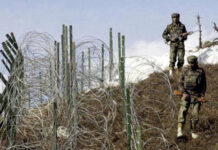SRINAGAR: The Jammu and Kashmir and Ladakh High Court, recognizing the sacrifices of security personnel in serving the nation, has directed the state government to pay Rs 5 lakh compensation to the family of a BSF constable who disappeared during the Kashmir Valley unrest 32 years ago.
Justice Sanjeev Kumar, in allowing the plea for compensation by the family of the disappeared soldier, remarked, “It is because of his duties and service to the nation that he was picked up by militants, tortured, and most probably killed. The State cannot be oblivious and ungrateful towards those who lay down their lives while protecting the nation.”
The case was brought before the court by Mst. Zooni, aged 65, and Gh Hassan Dhobi, aged 40, the mother and brother, respectively, of Nazir Ahmad Dhobi, who disappeared under mysterious circumstances in 1992. The petitioners, represented by counsel S. M. Saleem, sought implementation of the recommendations made by the J&K State Human Rights Commission (SHRC) in 2009, which included a compensation of Rs. 1 lakh and employment benefits under SRO 43 of 1994.
Also, the petitioners also sought compensation of Rs. 15 lakh from the state for its failure to protect the life and liberty of Nazir Ahmad Dobhi.
The state contended that Nazir, as a trained BSF constable, should have informed the authorities if he felt any security threat. They further argued that the Empowered Committee had already rejected the recommendations of the J&K State Human Rights Commission for compensation and employment.
After considering the rival contentions, Justice Kumar addressed the concerns regarding the recommendations made by the State Human Rights Commission and acknowledged the limitations of the Commission’s powers.
Citing State of Jammu and Kashmir v. J&K State Human Rights Commission 2018, the bench clarified that the Commission’s recommendations are not binding on the government, and the final decision rests with the government.
The court acknowledged the state’s primary duty to protect its citizens’ lives and liberties. However, it recognized the challenges faced by law enforcement agencies in situations of extreme violence.
The court reasoned, “It is axiomatic that the protection of life and property of its citizens is a primary duty of the State referable to Article 21 of the Constitution of India. However, the fact remains that State cannot watch each and every activity of citizens. There may be situations in which the State cannot help a person immediately when the life, liberty or property of such a citizen is in danger.”
Despite the state not being directly responsible for Nazir’s disappearance, the court emphasized the state’s moral obligation towards those who serve the nation. Considering Nazir’s service as a BSF constable and the “grudge” militants hold against security forces, the court concluded that the state cannot be “completely oblivious” to his family’s plight.
“The State must also bear a human face and rescue its citizens who suffer distress only because of the nature of the duties their kins perform in the service of the nation. Here is a case where the petitioner No.1 has lost her young son who was rendering his services to the nation as a BSF personnel,” said the court.
Consequently, the court ordered a compensation of Rs. 5 lakhs to Mst. Zooni as a tribute to her son’s sacrifice.















